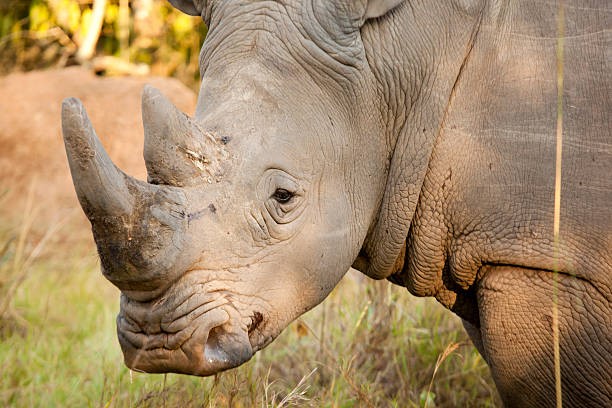how many white rhinos did akagera national park recieved-rwanda

Akagera National Park in Rwanda received 30 white rhinos that were flown in from the Beyond Phinda Private Game Reserve that is situated in South Africa. The transfer of the white rhinos from South Africa to Akagera National Park in Rwanda represents the largest single rhino translocation in wildlife conservation history.
These white rhinos traveled approximately 2,000 miles to Akagera National Park, their new home in Rwanda, where conservationists believe that these animals will be safe, establish a new reproductive base, and be free from severe poaching that had placed the rhino species in jeopardy. All the rhinos were sedated to restore their peace, calm them down, and prevent them from harm.
White rhinos are categorized as “critically endangered species” by the World Wildlife Fund, which believes that there are more than 18,000 rhinos in protected areas and privately owned game reserves. According to World Wildlife Fund officials, the decline in rhino species numbers is primarily due to poaching and an increase in demand for rhino horns.
Each of the 30 rhinos received at Akagera National Park in Rwanda was outfitted with a tracking transmitter that allows continuous surveillance. The main aim of the rhino translocation was to safeguard them from poachers. They believe that these rhinos are safer at Akagera National Park. Authorities at Akagera National Park have issued a dispatch note for an anti-poaching canine team and helicopter surveillance in order to monitor the safety of these rhinos.
The translocation of these 30 rhinos to Akagera national park gives Rwanda an opportunity to substantially improve its contribution to the rhino conservation program, with Akagera National Park standing as an internationally recognized sanctuary for African black and white rhinos. The rhinos were successfully relocated by the Rwanda Development Board, Beyond, and African parks with funding from the Howard G. Buffet Foundation.
In May 2017, Rwanda transported 18 black eastern rhinos from South Africa to Akagera National Park. The reintroduction of the rhino species has not occurred in Akagera National Park for the last 10 years.
The initial relocation of the rhinos to Akagera National Park required traveling over a 2,486-mile distance from South Africa to Rwanda. Since this relocation happened, the number of rhinos at Akagera National Park has increased. The relocation occurred just after the restoration of lions into Akagera National Park in July 2015 and the recent subsequent relocation of two more male lions to Akagera National Park with the aim of increasing the lion population of the current Rwandan pride.
Furthermore, five additional rhinos have been relocated from Europe to Akagera National Park in Rwanda with the help of the European Association of Zoos and Aquaria, which managed to translocate five rhinos, ranging from three females to two males, from different zoos in Europe and give them to the Rwandan government on June 24, 2019. These rhinos include Manny, Jasiri, Mandela, Jasmina, and Olmoti. The five rhinos were flown from Europe to Akagera National Park by a chartered Boeing 747-400F cargo jet that is operated by Air Atlanta.
Following a 10-year hiatus and relocation, visitors to Rwanda's Akagera National Park now have a better chance of seeing African rhinos. Rwanda has worked hard on security and development in Akagera national parks, including the establishment of an anti-poaching unit, the deployment of a helicopter for overhead monitoring within the park, and an increase in the number of park guards to improve security in the park and throughout Rwanda.
The African continent is estimated to have less than 5,000 black African rhinoceroses, with the bulk of the black rhino species surviving in South Africa. The reintroduction of black Eastern Rhinos to Rwanda's Akagera National Park has had a positive impact on the attractions of some tourist visits to Rwanda, with over 44,000 visitors registered at Akagera National Park in 2018.
Akagera National Park protects Over 20 black rhinos, 30 white rhinos, 15 lions, and 100 savanna elephants Akagera national park harbors over 500 bird species, making Akagera a famous bird-watching destination in Rwanda. Akagera national park also protects a number of primate species, such as the olive baboon, blue monkeys, silver monkeys, and vervet monkeys.
Besides rhinos, travelers interested in visiting Akagera national park also have greater opportunities for observing lions, giraffes, zebras, duikers, crocodiles, antelopes, hippos, and hyenas, to mention a few. Akagera National Park offers guided game drives both during the day and at night.
Akagera national park offers other tourism activities such as guided nature walks, boat cruises, behind-the-scenes safaris, a walk the line tour, fishing tours, and camping sites. Akagera national park also has lodging facilities where visitors can stay a night or two during their safari to this park, including Magashi Safari Camp, Rusizi tented lodge, Karenge Bush Camp, and Akagera Game Lodge.
